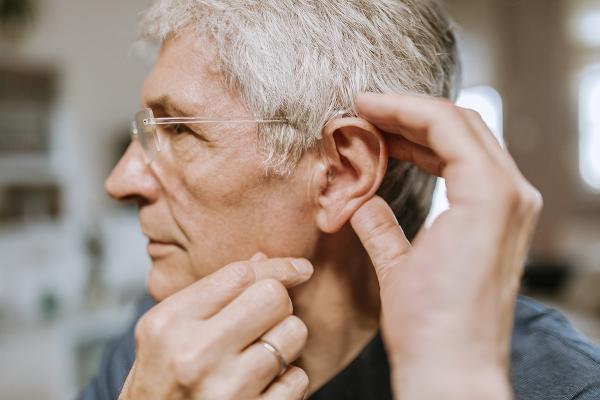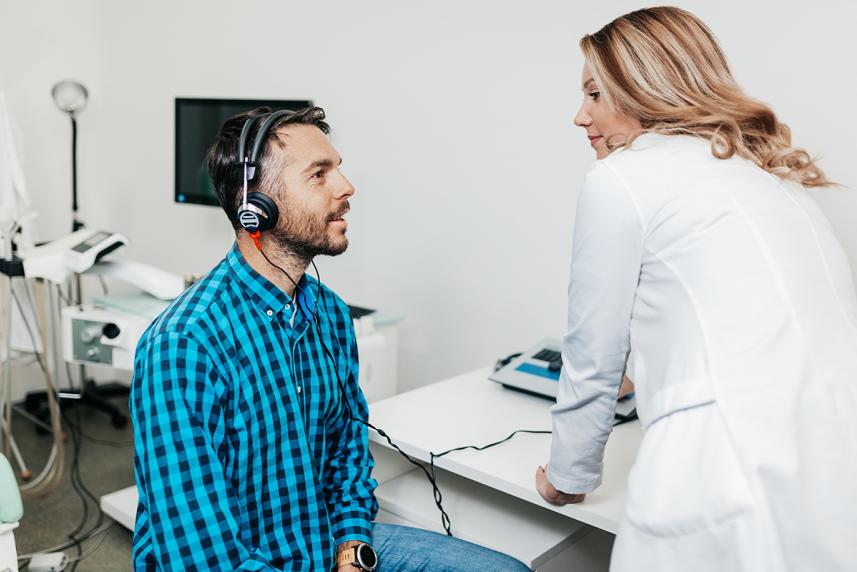
Could you be one of them?
A hearing exam is often the first step in diagnosing hearing loss. Here’s what might happen at the appointment.

So, you’ve been having a hard time hearing. Maybe you’re turning up the volume when you watch sports on TV. Or perhaps you’re asking friends to repeat themselves more often than you used to. Now what?
A good first step is to get a hearing exam. It can help determine the underlying problem behind your hearing loss, say Virginia Ramachandran, Au.D., Ph.D., past president of the American Academy of Audiology.
Some hearing problems may be caused by lasting damage to the structures inside your ear. But that’s not always the case. And not all hearing problems result in lasting hearing loss. Sometimes, the solution can be as simple as removing built-up earwax.1
If the cause of your hearing loss turns out to be more serious, you still don’t need to panic.
“In my 25-year career, hearing aids have evolved from things that really didn’t work well to devices that are really excellent,” says Erich P. Voigt, M.D., a head and neck surgeon at NYU Langone Health in New York City. “Today’s hearing aids are so stealthy and small that they’re really not even visible.”
A hearing exam can help hearing care professionals understand the cause of your hearing issues and provide specific recommendations for you, which may include hearing aids. Here’s what you can expect at your appointment.

Could you be one of them?
If you’ve ever had your hearing screened during a yearly physical, you might be familiar with this kind of exam.
Your primary care provider uses a tool to take a good look into your ear canal and eardrum.2 Ramachandran says your provider will look for problems that could distort your hearing, including:
Swelling and fluid buildup could signal an ear infection.3 Luckily, treating it will likely treat your hearing loss. The same goes for earwax buildup — removing earwax should lead to improved hearing.1
Your doctor may also give you a basic hearing screening.4 If you don’t pass it, your provider will recommend you see a hearing care professional for more in-depth testing, says Ramachandran.
Want to meet with a hearing care professional first? You don't need a referral to schedule a comprehensive hearing exam and referral with EPIC Hearing Healthcare.
Hearing care professionals, which include audiologists, hearing aid dispensers and hearing instrument specialists, specialize in treating hearing loss and balance disorders.5
During a typical visit, your hearing care professional will perform a series of tests to help determine:
Some of the more common tests done by hearing care professionals include:
Depending on the type and number of hearing tests you undergo, you can expect your hearing appointment to last anywhere from ten minutes to an hour, says Ramachandran.
There isn’t anything specific you need to do to prepare for a hearing exam.6 That said, it’s a good idea to write down the specific situations you have trouble hearing in, as well as words and sounds you struggle to understand. That might look like this:
Bringing this list to your hearing care professional may help them as they try to find the cause of your hearing loss.
Getting your hearing checked is the first step to better hearing. Once you schedule and take your comprehensive hearing exam, your hearing care professional will discuss treatment options, such as hearing aids, with you. The end goal is to help you more fully engage again in everyday activities.
Ready to request a hearing exam and consultation? EPIC Hearing Healthcare has a wide network of hearing care professionals. Find a provider.
Sources
Information is for educational purposes only and is not a substitute for the advice of a licensed medical provider. Consult your provider prior to making changes to your lifestyle or health care routine.